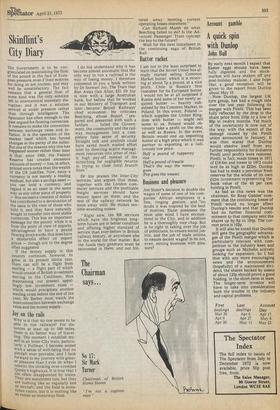Skinflint's City Diary
The Government is to be congratulated on maintaining the float , of the pound in the face of Euro pean pressure, even if their motives for doing so are unclear, and may well be unsatisfactory. The fact remains that a general float of some kind was the only solution left to international monetary dis ruption; and it was a solution arrived at under pressure rather than through intelligence. The Spectator has often enough in the Past argued for floating currencies. It remains to make the connection between exchange rates and inflation. It is the operation of the market itself which has forced changes in the parity of the dollar. But one of the reasons why this has happened sooner rather than later IS that, since 1965, the Federal Reserve has created excessive amounts of money — has, in effect, printed more notes than the wealth of the US justifies. Now, since a currency is not merely a trading medium, but also a savings asset — You can hold a currency, and regard it as an asset in the same way as any other piece of property — this excessive creation of dollars has contributed to a devaluation of the issue in the view of those who hold it, and they have naturally sought to transfer into more stable currencies. This has an important message for the pound: while it is from the point of view of exports, advantageous to have a pound floating downwards, this does have a deleterioUs effect on import Prices — though not to the degree Often suggested. If the money supply in this country continues, however, to grow at its present idiotic rate, there can still be a flight from sterling — a flight part of which would consist of British investment moving to the Continent, thus maintaining our present appallingly low investment rates — Which would precipitate another sterling crisis before the end of the
Year. Mr Barber must, watch the interconnection between exchange rates and the money supply.
Joy on the rails
Why is it that no one seems to be able to run railways? For distances at least up to 500 miles, there is no better way of travelling. The moment I establish myself in an Inter-City train, particularly a Pullman, I become seized With a sense of well-being that no aircraft ever provides, and I look forward to my journey with greater pleasure than I ever do when I take to the stinking over-crowded Queen's highways. It is true that I am often disappointed by trains. They are sometimes late, but they are nothing like so regularly late as aircraft; and the food is sometimes rotten, but it is nothing like SO rotten as motorway food.
I do not understand why it has become almost axiomatic that the only way to run a railroad is the way of losing money. I therefore commend to you a book written by Dr Stewart Joy, The Train that Ran Away (Ian Allan, £3). Dr Joy is now with a large Australian bank, but before that he worked in our Ministry of Transport and later . became British Railways' chief economist. He criticises Beeching, whose Report "prepared and presented with such a fanfare . . . lulled the Government, the community and the railway management into a completely false sense of security. Straight talk and analysis could have saved much wasted effort later by directing scarce management resources into areas of really high pay-off instead of the scratching for negligible returns in trying to close rural branch lines.
Dr Joy praises the Inter-City services, and argues that these, together with the London commuter services and the profitable freight services should have , money spent on them, and the rest of the railway network be done away with. He makes sensible-sounding noises: "Right now, the BR services which have the brightest longterm future are in better condition and offering higher standard of service than ever before in British railway history, or anywhere else in the world for that matter. But • the funds they generate must be reinvested in them, and not frit tered away meeting current operating losses elsewhere."
Can Richard Marsh do what Beeching failed to do? Is the Advanced Passenger Train concept the key to the future?
Wait for the next instalment in the continuing saga of British Rail.
Butter racket
I am not in the least surprised to learn that the Soviet Union has already started selling Common Market butter, which it is receiving at about 7p a pound, at a nice profit. Chile is Russia's first customer for its European butter. I would not be at all surprised if Russia sold some of her newly acquired butter — heavily subsidised by the Common Market, to Poland. In this event, Poland — which supplies the United Kingdom with butter — might sell some to us. Poland would obviously take a profit on the deal, as well as Russia. In the event, Britain would end up importing butter at a high price which it was partner to exporting at a ludi crously low price.
Half a pound ot tuppenny rice Haifa pound of treacle That's the way the money goes Pop goes the weasel.
Business and pleasure
Jim Slater's decision to double the wages of some of one of his companies' African employees is a fine, ringing gesture, and 'no doubt it was inspired by the best of motives. Slater possesses the most able mind I have encountered in the City, and in addition he is a thoroughly nice chap. But is he right in taking over the job of politicians, to ensure social justice, and the job of trade unions, to ensure decent wages? Is he not, even, mixing business with pleasure?


































 Previous page
Previous page